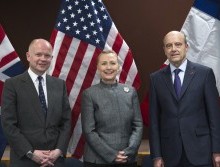The United States said on Monday that more nations are cutting back on Iranian crude oil purchases as the bite of sanctions intensifies, ahead of the next round of negotiations between the major world powers and Iran over the latter’s nuclear program. And while those meetings may only be next week, the sides are already talking to set the stage for what could be a crucial discussion.
US Secretary of State Hillary Clinton announced on Monday that seven more nations have “significantly reduced their volume of crude oil purchases from Iran,” according to a statement from her office. They join 11 other nations who already did so in March. The US has pressured nations around the world to decrease oil imports from Iran in an effort to tighten sanctions on the Islamic Republic.
“We have implemented these sanctions to support our efforts to prevent Iran from acquiring a nuclear weapon and to encourage Iran to comply with its international obligations,” said Clinton in the press statement.
“Today’s announcement underscores the success of our sanctions implementation. By reducing Iran’s oil sales, we are sending a decisive message to Iran’s leaders: Until they take concrete actions to satisfy the concerns of the international community, they will continue to face increasing isolation and pressure.”
Clinton nonetheless noted that they remain “committed” to a “dual-track policy” of sanctions and diplomacy to convince Iran to comply, highlighting the American participation in the upcoming nuclear talks in Moscow.
Those meetings, which begin next Monday, will feature the P5+1—the US, the UK, France, Russia, China and Germany—in discussions with Iran. The last round of talks included presentations by both sides of their positions in the nuclear dispute, including calls by the P5+1 for Iran to take confidence-building step towards a comprehensive agreement.
The aim of the talks is to “resolve our concerns” regarding Iran’s nuclear program and potential weapons work, according to Clinton. “Iran has the ability to address these concerns by taking concrete steps during the next round of talks in Moscow,” said Clinton.
Meanwhile, that message is being conveyed by European foreign policy head Catherine Ashton to Iran. On Monday, her spokesperson said the European Union diplomat spoke with the Iranian negotiator regarding the upcoming meeting.
According to the spokesperson’s statement, “They agreed on the need for Iran to engage” on the proposals of the P5+1, which “address its concerns on the exclusively peaceful nature of the Iranian nuclear program.”
Ashton also shared the P5+1’s “readiness to respond to the issues raised by the Iranians” in the last round of talks in Baghdad.
(By Joshua Spurlock, www.themideastupdate.com, June 11, 2012)

